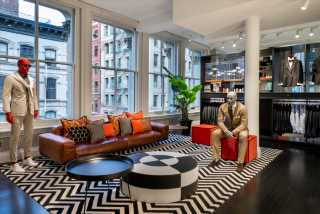
Tailored Clothing Business Begins Slow Climb Back
04/20/2021Look closely. Squint if necessary. There, off in the distance, is a light.
That’s how retailers are describing the state of the men’s tailored clothing business.
In the past few weeks — after a long drought when sweatpants overtook suits as the outfit of choice for working from home — the category has begun experiencing signs of life as the pandemic starts to loosen its grip around the country and consumers prepare to travel, attend weddings and events — and go back to the office.
And while no one is characterizing it as a robust rebound, there is definitely a feeling of optimism.
“What we’re seeing is the beginning signs of coming out of hibernation in the tailored clothing business,” said Bob Mitchell, co-chief executive officer of Mitchells Stores. “More people are coming in, planning for weddings and events. We have not seen a big resurgence in clothes to wear to the office, it’s more event-driven. But we’re selling suits and sport coats and women’s dresses.”
Even so, Mitchell is keeping it in perspective: “The numbers have gone from nonexistent to very challenging, but they’re improving, so we have hope.”
Mitchell is not alone.
Nordstrom is also seeing signs of life. Shea Jensen, executive vice president and general merchandise manager of men’s and women’s apparel for the Seattle-based retailer, said: “As stores reopen and vaccines roll out, we’re hearing from our stores that there’s a demand for dresswear for occasions such as weddings and parties. The customer is feeling excited about getting back to life.”

Related Gallery
All of the Fashion at the 2021 BAFTA Awards
Shoppers are searching for “versatility” in their wardrobes and they’re seeking separates more than nested suits, she said.
Formalwear has also been a bright spot. Nordstrom started working with the Black Tux tuxedo rental business in 2017 and there are now shops in 23 stores. “We’ve definitely seen an uptick in the number of customers coming in to use the service,” Jensen said.
Although the situation continues to be tenuous with an renewed upsurge in cases in some states, vaccine hiccups, virus variants and other concerns, Jensen remains upbeat, especially about the fall and holiday seasons.
“It’s hard to predict, but we feel optimistic. In the fall, more workers may return to their offices and begin to travel on business again, requiring a more dressed-up aesthetic,” she said. “Some people may still be remote, but there are reasons to get back to work. People are looking up and looking forward and we’re delighted to welcome back our customers.”
Mitchell, too, believes the situation will continue to improve as the year progresses, but knows the real test will be after the summer. “We won’t really know about the dress-up men’s piece until September,” he said. “We’re seeing most events are being planned for September, October, November.”
Until then, the Mitchells stores on the East and West Coasts will continue to concentrate on sportswear. “I think we’ll see a recovery of casual between now and June,” he said.
Mitchell said the stores are starting to host trunk shows again, and while many of those are still centered around luxury sportswear and hybrid dressing, suits are starting to find fans, too. With brands such as Zegna, Cucinelli and Kiton, “they’re coming in for sportswear but they’re picking up tailored clothing while they’re here,” Mitchell said. “We just need more people in the door to help the numbers recover, but customers are definitely more hopeful. We just need many more people vaccinated.”
The optimism is also hitting the big and tall market. In its fourth quarter earnings report in mid-March, Harvey Kanter, CEO of Destination XL, the men’s big and tall retail chain, said the company has begun to see an “uptick” in sales of tailored clothing, specifically sport coats and dress shirts.
Kanter cautioned that it “is still very early in the year and we certainly have a long way to go. But the early signals that we are seeing in 2021 are pointing toward a recovery in stores as the restrictions around gatherings are eased and our customer feels more comfortable venturing out from his home. We remain cautiously optimistic and we are monitoring to see if the pent-up demand will wane or carry into summer and even the fall and winter months ahead.”
For Suitsupply, the issue is not getting guys back in its stores, it’s staffing. According to CEO Fokke de Jong, “Our business is back — we’re seeing a pretty big uptick now. Our main issue is not customers, but making sure we have the right people. We’re ramping back up everywhere and we’re hiring.”
He said the rebound started around two months ago in states such as Florida and Texas, which were quick to reopen. “And now it’s spreading to the East and West Coasts.” All told, Suitsupply operates around 40 stores in North America.
Like the other retailers, Suitsupply is selling a lot of its modern tailored clothing for events. “There’s a lot of pent-up demand,” de Jong said.
“We’re finding men want to look good again and go out, and stop watching Netflix,” he said with a laugh.
For many of those excursions, they’re buying “elevated casualwear,” such as sport coats, trousers, pop-overs and other pieces. “It’s a little more of a relaxed way to wear tailoring,” de Jong said.
And while online has been strong during the pandemic, men are visiting stores again. “Our stores are busy. People are seeking style advice,” he said. “We don’t believe stores are dead and we don’t believe tailoring is dead. Everyone was projecting we’d be wearing sweatpants for the next 10 years, but that’s not how you want to look when you go to an event, on a date or to a meeting. People are ready to feel good and get out; it’s a very natural progression.”
Drew Green, CEO of Indochino, also remains bullish on the tailored business. In fact, the Vancouver-based company continued to open its “showroom” retail stores at the rate of one a month since the start of the pandemic and by July, the company expects to have 80 locations open.
“We’ve seen an incredible resurgence in the last two-and-a-half to three months,” he said, “which is really encouraging. Every week the demand continues to grow.”
Inside an Indochino showroom. Dennis Hill
Although Indochino offers some casual items, Green said the majority of sales have been for the company’s made-to-measure suits. “Suits as a percentage of sales are actually higher than they were pre-COVID-19,” he said. “It’s all those weddings that were postponed in 2020. And in different parts of the country, people are also going back to the office. But while jeans and tracksuits are OK, people want to refresh their wardrobes and dress up again. So they’re coming back in droves.”
Green believes that this surge is a sign of even better times ahead. “The ‘20s are going to be an incredible decade for our type of apparel,” he believes. The lockdowns endured during the pandemic will have a lasting impact on people’s psyches. “They just want to get out, see family and friends, go to dinner, attend events,” Green said. “And that will continue for years to come.”
Tailored Brands, owner of Men’s Wearhouse and Jos. A. Bank Clothiers, was forced into bankruptcy during the pandemic as its tailored clothing business plummeted and its stores closed. And although its struggles continue — it just went back to bankruptcy court to obtain approval for another $75 million loan and its CEO and chief customer officer recently exited — the situation is improving.
The Next-Gen Men’s Wearhouse store. Dee Zunker
Carolyn Pollock, chief marketing officer, said: “We’re certainly encouraged by what we’re seeing. Men are ready to get out of their sweats and hoodies. There’s something about putting on a blazer that is empowering. And as they start to go out to dinner, to the office or a wedding, we’re seeing that fuel the tailored category.”
She said suits and sport coats are both “trending up, and we’re seeing tremendous growth in neckties, which was surprising.”
Like most other men’s wear specialists, Tailored Brands is experiencing the shift away from traditional suits to a hybrid model of elevated sportswear. This week, the MSX by Michael Strahan “workleisure” collection is hitting Men’s Wearhouse stores. The line offers performance features and is intended to take the guy from “the golf course or the gym.” It will complement the Collection by Michael Strahan line, which is more tailored.
Interestingly, although Tailored Brands has a large tuxedo rental business, Pollock said that a lot of men are opting to wear suits rather than tuxedos to weddings and other formal events, also providing a boost to the business.
“We’re starting to see restrictions loosening, people are getting out and there’s a lot of pent-up demand for apparel,” Pollock said. “We’ve been over plan for the last 16 weeks, we’re seeing encouraging signs of traffic in our stores and on our website, so we’re encouraged for the rest of the year.”
Paulette Garafalo, CEO of Paul Stuart, had to make some tough decisions to keep the business afloat during the pandemic. That includes a significant downsizing of its Madison Avenue flagship. Since the retailer doesn’t own the building it has called home since 1938, Paul Stuart quietly gave back the second floor to the landlord a few months ago, bringing the selling space to 15,000 square feet from 30,000 square feet. There’s also 10,000 square feet in the basement for storage.
The expansive tailored clothing department on the second floor has relocated to the back of the main floor, sportswear is now front and center, followed by the more modern Phineas Cole collection, furnishings and shoes. The hair salon that had been installed during a 2017 renovation of the store has now been turned into the tailor shop. Women’s continues to be housed on the mezzanine, along with offices.
The town house next door was also returned to the landlord and the retailer took a smaller space across Madison Avenue for its clearance store, PS 45.
“The rent was prohibitive,” Garafalo said. And it’s no longer necessary to keep large amounts of stock on the floor.
But while the past year has been rough, she said there are bright spots. “In the last month, we’ve started to see a pickup,” she said. “She said there has been renewed interest from longtime customers in made-to-measure and off-the-rack suits are selling to men coming into the store to refresh their wardrobes for upcoming weddings and special events. “It’s not tuxedos, but people are going out to dinner more and they want a little fashion,” she said.
Garafalo also said that while the size of the transactions is increasing in the flagship, traffic is still nearly nonexistent since most offices remain closed. “It’s more destination shopping,” she said. “The bigger the company, the more they’re worried about liability. The smaller companies seem to be coming back more quickly, but it doesn’t look like traffic will really pick up until after Labor Day.”
That’s one reason Paul Stuart opened a store in Southampton, N.Y., last summer. Initially a pop-up, the decision was made to keep the space all year. Garafalo said while business was tough in January and February, as expected, March was better and April continues to strengthen. That store is focused more on sportswear, but also offers some more tailored options as well as made-to-measure.
Outside New York, the company’s Chicago stores are doing well, particularly with the Phineas Cole collection, but its Washington, D.C., branch is “slow to come back,” she said. “Some of our top customers have not left their houses. People are still being cautious and they want the final blessing from the CDC.”
Knot Standard, which specializes in custom suits and operates nine showrooms around the country and also has shops in Bloomingdale’s as well as an online business, is among the younger companies that are beginning to see “green shoots,” according to its cofounder and CEO John Ballay. “Everything is relative to two baselines: the COVID baseline and the 2019 baseline. Consumer spending was better in March of this year than March of 2019 so in general, the economy is improving.”
For Knot Standard specifically, Ballay said the company has seen a “drastic increase in sales from February to March, but our physical appointments are only up 20 percent. So the new normal is that we will have a lot of virtual commerce.”
A Knot Standard showroom. Courtesy Photo
Last month, he said, orders were up 20 percent with popularity in pieces that were “slightly more formal” as guys picked up new suits and shirts to wear to events. “But there’s continued uncertainty by city with what the office structure is going to look like,” he said. Although some office workers have returned and people are beginning to travel, the return is slow. But when it comes to events, the dates are set and people know they’re going to need to get dressed up, hence the uptick there.
Paul Trible, cofounder and CEO of Ledbury, the Richmond, Va.-based shirtmaker that has also expanded into suits, said that although business “slowed dramatically” during the pandemic, “dress shirts didn’t die as has been portrayed.” Instead, for holiday and spring, the company is “seeing a resurgence,” particularly in the larger Southern markets.
“The idea that the tailored look is dead is way overblown,” he said. “Events that have been postponed for a year are being rescheduled” and a recent custom event the company hosted at its flagship in Virginia “hit pre-pandemic numbers. People were buying suits for weddings and events. The event-driven clothing purchases will really explode hopefully in the late summer and fall,” he said.
In addition, the brand recently launched a small-batch footwear brand, Tangier, that is intended to work with dress and casual wardrobes. Dress shoes will be added in the fall, Trible said.
“My belief is that once people start interacting again, it will increase interest in what we sell. They’re going to look in their closets and everything is going to be dusty and they’ll want a refresh. You can only have so many sweatpants and that will actually be the signal of reemerging from lockdown.”
Source: Read Full Article




